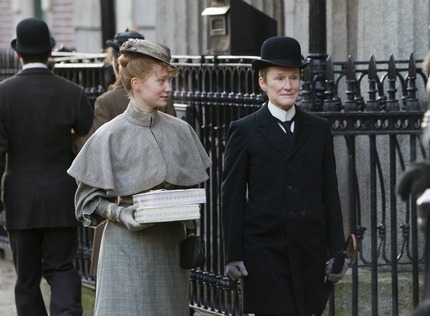ALBERT NOBBS Review

Actually, I suppose there are many things in the world more disappointing than that -- I'm just trying to express my frustration with Rodrigo García's Albert Nobbs in consideration of what it might have been. Headlined by a trio of likable actresses doing solid work, and featuring a passing-for-a-man premise that could have been worked into any number of interesting narrative and thematic directions, the film nonetheless feels like an unappetizing mix of the stodgily old-fashioned and the self-consciously "edgy." Yes, I realize that the source material is a 1927 short story, but perhaps the modernist sensibility could have been updated to reflect the changing times? Just an idea.
I've always admired Glenn Close, but here the script ultimately does her talents a disservice. Playing the title character, a butler at a snooty hotel in which the staff are otherwise earthy and outgoing, she maintains a dignified reserve that effectively parodies the ideal of the Victorian "gentleman." But after this notion became apparent I kept waiting for the other shoe to drop: when would her lifetime of service to both the class system and its prevailing gender politics be used to emotionally devastating ends? Yet instead of a rival to something like The Remains of the Day, perhaps with some farcical elements thrown in, we get a rather tired melodrama -- will the conspiring young couple take advantage of the generosity of the woman's older admirer? The only difference here is that the "older admirer" is in drag. The result is that the casting of the formidable Mia Waskowskia as the center of this tepid love triangle is largely an instance of overkill. Similarly, the typecasting of Jonathan Rhys Meyers in a cameo as a decadent nobleman, as well as Brendan Gleeson as an amiable drunk, add to the sense that this is a classic case of a film that's been over-produced and under-thought.
Still, Janet McTeer is wonderful, as you may have heard, lending every scene she's in a depth that I'm guessing is not really in the script. But McTeer is not on screen nearly long enough to goose the rest of Albert Nobbs into anything resembling a fully engaging picture. This is partly because García, along with co-writers Close and John Banville, avoid the elephant in the room: sex. To be clear, I'm not saying that sexual acts per se need to be depicted in the film (they are, actually), but simply that the theme needs to be addressed in terms of the protagonist, not only in the context of the straight couples.
In short, if one of the central ideas here is that Nobbs's long-term repression, or gender confusion, has resulted in a total absence of desire, that's fine, but even that needs to be dramatized. As is, the psychology is just way too oblique. When Close kisses a woman, or observes a nude female body, her eyes open wide in shock... but is this just an exaggeration of your standard Victoria reaction, or is it dismay at not knowing how to respond as a practical matter, or is it pure arousal -- and then panic because of the need to manage of that arousal? The problem is that García doesn't draw a performance from Close that could preserve these ambiguities but additionally make them deliver any emotional impact beyond the moment; nor does the script offer much that would tend to support any one of the above theories. Instead, we just get a bunch of isolated incidents that don't really build on each other.
In fact, a comparison can easily be drawn to (stay with me now....) 2010's would-be exploitation flick Ticked-Off Trannies with Knives -- a film that many found offensive by its very title. I was more offended by how, aside from suggestive outfits and the occasional dirty joke, its script effectively neutered the characters even as it purported to underscore a vive la différence theme. Essentially the same thing happens here, albeit on a more "literary" level. And, sadly, the much-buzzed-about flashing scene amounts to little more than hand-waving. After all, a quick topless shot is easier to manage than intimately showing what two women living together as husband-and-wife might look like, or how a cross-dressing woman who wants a wife for practical reasons might cope with the inevitable sexual tension. In the end, then, Albert Nobbs's avoidance of authentic sexuality makes what's intended to be a commentary on the repressed Victorian era actually a commentary on repressed twenty-first century popular entertainment.
Albert Nobbs is currently in limited release in the U.S. and Canada, and has a wider release on January 27, 2012.
Albert Nobbs
Director(s)
- Rodrigo García
Writer(s)
- Gabriella Prekop (screenplay)
- John Banville (screenplay)
- Glenn Close (screenplay)
- George Moore (novel)
- István Szabó (screen story)
Cast
- Glenn Close
- Antonia Campbell-Hughes
- Mia Wasikowska
- Pauline Collins

Do you feel this content is inappropriate or infringes upon your rights? Click here to report it, or see our DMCA policy.






